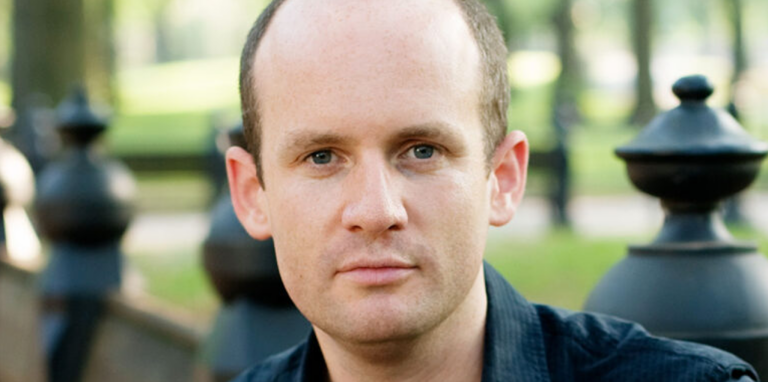Time Management for Mortals
Oliver Burkeman with Krista Tippett
An excerpt from the in-depth On Being conversation between Oliver and Krista.
Oliver Burkeman is a journalist and author. His most recent book is Four Thousand Weeks: Time Management for Mortals. He’s also the author of The Antidote: Happiness for People Who Can’t Stand Positive Thinking. He writes and publishes a twice monthly email newsletter called “The Imperfectionist.” You can find The Guardian column he wrote from 2006 to 2020 online. It’s titled, “This Column Will Change Your Life.”
Find the full show “Oliver Burkeman — Time Management for Mortals” at onbeing.org.

Transcript
Krista Tippett: This idea of time and how we use it, what it is, how we use it, it also really ends up being a way into what is a deep spiritual truth at the heart of all the great traditions, and also just the psychology behind them: that what we pay attention to — and also just our understanding of the mind, which is increasingly sophisticated — that what we pay attention to defines us and defines reality for us. And this approach to these questions, then, it kind of shines a different — it’s an interesting nuance of the light that we shine on how the digital worlds — what the digital world as part of human life — how the digital world kind of ratchets up these bedrock dilemmas that we’re talking about, in an existential way; I mean, just even the language of the “attention economy” or “persuasive design,” which you talk about in this context. I wonder if you would just — and of course, these are phrases I’ve heard before, but I feel like you are opening them up in such an interesting new way in this.
Oliver Burkeman: I mean, there were two points I felt I really wanted to try to make about attention, beyond that one that it just, you know, it is what our life consists of. And one of them, yes, was then how central this question of attention-mining technologies are.
But the point that really I think is so important, there, is that this doesn’t just take your attention for the time that you’re using it, right? This is what I really began to notice when I got most deeply into social media, is that it wouldn’t just be the hour that you whiled away on a social media platform that was changed by that hour, but then, like, three hours later I’d be making dinner or at the gym or something, and in my mind I would be prosecuting arguments against these incredible idiots whose views I’d had to be exposed to earlier in the day. And I mean, that’s a strange way to be, [laughs] firstly because it obviously is changing what my attention is on for much longer than that initial hour, and then, secondly, because these people — I mean, they probably don’t know I exist at all, in most cases, that I’m in a sort of state of fury about.
Tippett: Also, you wrote this interesting piece in The Guardian about a certain mindset that has taken hold in this world of limitless media, that so many people feel — that there’s this — you know, there used to be this kind of duty of the citizen to be informed. That’s an idea that’s been around a long time. But that was also in a world of scarcity and not limitlessness, where you had to do some work to find the news and it wasn’t constantly being [laughs] refreshed every five minutes. And you said that that has shifted, and again, that we haven’t been necessarily — this hasn’t been necessarily a conscious, intentional, self-aware shift, and certainly not thinking about the consequences of not just a duty to be informed, but a duty to not turn away from all the information that’s out there and, you say, the belief that we’re “morally obliged” to stay plugged in.
Burkeman: I really started to notice this just a few years ago, I guess, it was four or five years ago, the way that more and more people I knew, and certainly people I observed on social media and, to some extent, myself — they’d sort of shifted the center of gravity. You had the sense that they saw themselves as primarily existing sort of in the news cycle. And then things like what they did in their house, and their family or where they worked and the street they lived on, were kind of somehow secondary and that they sort of fundamentally lived in the drama of the news.
And I think part of the reason for that is that these attentional technologies give us a feeling of acting on it. Even just scrolling is more active than watching a TV bulletin. And commenting and retweeting and all the rest of it is obviously significantly more active. And so there’s this feeling that you’re somehow doing your bit —
Tippett: You’re participating.
Burkeman: Right. Absolutely. It’s especially difficult because probably nobody who is spending their whole day distracted by celebrity gossip is under any illusions that this is somehow some high duty of citizenship in a democracy that they’re performing. But I think you very easily can think that when the substance is the drama of national and international news. But because there is so much more of it than our attention could ever take up, it might be the case you have to sort of proactively not care about a huge number of very important issues in the world just so that you can meaningfully care about one or two of them. It might be that you have to do that just in order to consolidate your efficacy.
Tippett: And that gets back to that point that each and every one of us, to do what we actually mean idealistically, when we say “manage” time, structure our lives in a meaningful way, not merely a productive way. We’re going to have to not do a lot of things that we would like to do, in order to really invest and really be present to the things that are going to make our lives worth living and that we are — I don’t know, I use this language — that we are specifically called to, either by where we are or who we are, what our gifts are, or just the place we find ourselves in and its needs.
Burkeman: Yeah, I think that it entails this ability to sort of tolerate a kind of anxiety that is built into that situation, right, that actually dissipates a bit if you are willing to tolerate it, but that is this uneasiness of knowing that you are neglecting things, that there are people and causes and work projects that have an absolutely legitimate claim on your attention and are not going to get it. It’s not easy, especially if you have got any form of kind of people-pleasing motivation in you, or conflict aversion, which I most certainly have. [laughs] It’s — yeah, you have to sort of pick a fight with the world, in a way, at least, in order to focus meaningfully on a few things.
